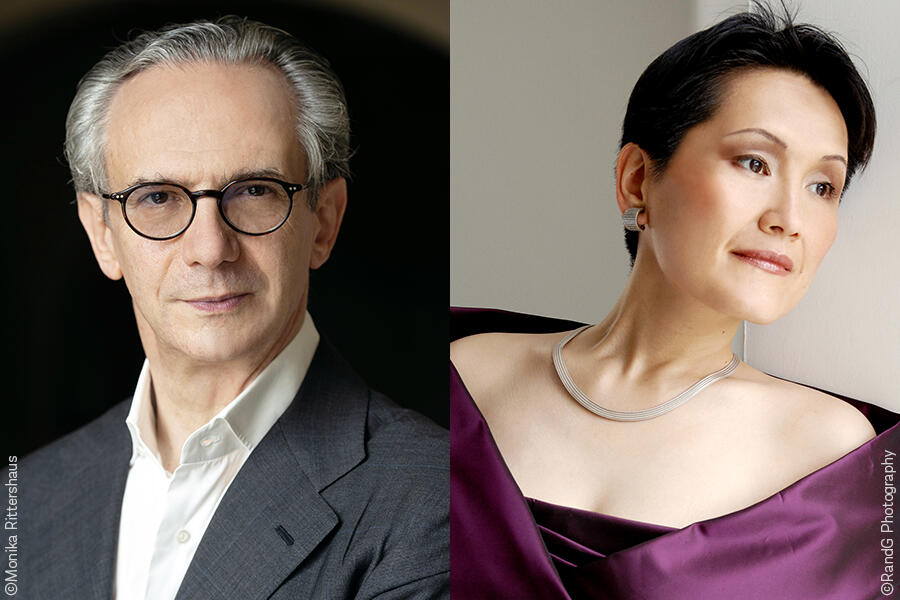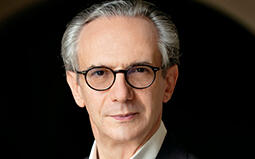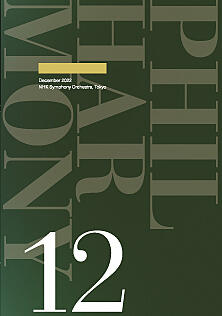- Home
- Concerts
- Subscription Concerts 2022-2023
- Program A
- No. 1971 Subscription (Program A)
No. 1971 Subscription (Program A)

Program
Wagner / Wesendonck Lieder
Wesendonck Lieder (Wesendonck Songs) originated almost certainly from a forbidden love. These five songs for female voice and piano were composed by Wagner in 1857–1858 from poems by the wife of his patron, Mathilde Wesendonck with whom the composer is said to have an affair. During this period, he was also working on Tristan and Isolde, an epoch-making opera on a tragic story of forbidden love. The orchestrated version performed today was prepared by the Wagnerian conductor Felix Joseph Mottl in 1893.
The set opens tranquilly with Der Engel (The Angel) which tells about angels carrying a heart heavenward for deliverance when it bleeds in sorrow. The next Stehe still! (Be still!) pleads with wheel of time to stop whirling, then yearns for the taste of bliss in sweet oblivion. Im Treibhaus (In the Greenhouse) lets the poet have pity upon foreign plants as "we share the same fate," "although we are bathed in splendid light, our home is not here." Subtitled "Study for Tristan and Isolde," this song became a base for Prelude to Act 3 of the opera. In Schmerzen (Pains), we hear a trumpet fanfare glorifying the Sun when "it awakens like a victorious hero." But the pessimism prevails, stressing that "only pain brings about bliss." Träume (Dreams) fades away in quietness as "the dreams bloom and then sink into their grave." Another "Study for Tristan," this song would be expanded into the love duet of Act 2 of the opera.
Bruckner / Symphony No. 2 C Minor (First Version / 1872)
Radical chromatic harmony, large-scale orchestra and the feeling of endlessness are some of the trademarks of Wagner' music. And the Austrian great symphonist Bruckner is one of those who were strongly influenced by this charisma. His quasi-religious worship was so deep that people around them, even Wagner himself, seemed to be perplexed. The two musicians first met in 1865 at the premiere of Tristan and Isolde. In 1873, Bruckner visited Wagner with his newly completed Symphony No. 2 and unfinished No. 3 in his hand, and No. 3 ended up being dedicated to the master.
Bruckner completed No. 2 in September 1872, but the premiere was canceled as performers judged it to be impossible to play. He revised it so the new version was publicly heard in 1873. Afterwards, he retouched it several times like he did with his other symphonies, whence comes his nickname "revision mania." The 1872 first version was first recorded only in 1991 in the critical edition by William Carragan which the International Bruckner Society published in 2005.
Contrary to the general view of revision as an act of "improvement," this first version is both precious and interesting because it was unperformed against Bruckner's will and it reveals to us his intact initial conception of the work preceding numerous modifications made in response to comments from others. It is overall (especially the finale) much longer than the revised versions, defining more clearly the composer's renowned spacious perspective and temporal sense. Its perfect example is the number of general pauses (where the whole orchestra is silenced momentarily) reduced in the later versions. This work's byname "Symphony of Pauses" is therefore truer of the original. Moreover, compared to the revised ones, the first version has the reversed inner movements with the Scherzo coming before the slow movement as with Beethoven's Ninth Symphony (1824). And just like this Ninth, Bruckner's No. 2 begins with the strings' tremolo (tremulous effect), which would since be his usual trick to open his symphonies. After the wild Scherzo and the ecstatically mellifluous Adagio, the awe-inspiring C-minor finale attains the confident, radiant C-major ending.
Artists
 ConductorFabio Luisi
ConductorFabio Luisi
Fabio Luisi hails from Genoa. He is the Principal Conductor of the Danish National Symphony Orchestra and the Music Director of the Dallas Symphony Orchestra. From September 2022, he assumed the position of Chief Conductor of the NHK Symphony Orchestra, Tokyo.
Fabio Luisi was Principal Conductor of the Metropolitan Opera in New York, General Music Director of the Opernhaus Zürich, Principal Conductor of the Wiener Symphoniker, as well as General Music Director of the Staatskapelle Dresden and the Sächsische Staatsoper, Artistic Director and Principal Conductor of the MDR Sinfonieorchester Leipzig, and Music Director of the Orchestre de la Suisse Romande. He is Music Director of the Festival della Valle d’Itria in Martina Franca (Apulia) and has appeared as guest conductor with numerous renowned ensembles, including the Philadelphia Orchestra, the Cleveland Orchestra, the Münchener Philharmoniker, the Filarmonica della Scala, the London Symphony Orchestra, the Concertgebouworkest, and the Saito Kinen Orchestra, as well as with various prominent opera orchestras.
Important recordings include Verdi, Bellini, Schumann, Berlioz, Rachmaninov, RimskyKorsakov, Frank Martin, and Franz Schmidt, the largely forgotten Austrian composer. In addition, he has recorded various symphonic poems by Richard Strauss, and a lauded reading of Bruckner’s Symphony No. 9 with the Staatskapelle Dresden. His recordings of Wagner’s Siegfried and Götterdämmerung with the Metropolitan Opera Orchestra won Grammy awards.
 Mezzo sopranoMihoko Fujimura
Mezzo sopranoMihoko Fujimura
Mihoko Fujimura, one of the leading sopranos in Japan, boasts a beautiful and penetrating voice rich in expression and perfect vocalization, and is unrivaled especially in her repertoire of German operas including Wagnerian works. She was the !rst Japanese to sing a leading role at the Bayreuth Festival, debuting in 2002, since then, she has returned to Bayreuth for 9 consecutive years singing all of Wagner's major mezzo-soprano roles, indeed a monumental achievement. She has sung at major opera houses including the Metropolitan Opera House in New York, La Scala, Milan, and the Wiener Staatsoper, in addition, as a most sought-after concert soloist, she has appeared in concerts of the world renowned orchestras including the Wiener Philharmoniker and the Berliner Philharmoniker on a regular basis, and has won trust from famed conductors such as late Claudio Abbado, Christian Thielemann, Simon Rattle and Andris Nelsons.
She studied at the Tokyo University of the Arts, its graduate school, and the University of Music and Performing Arts Munich. She received the 2002 Idemitsu Music Award, the 2003 Minister of Education, Culture, Sports, Science and Technology Art Encouragement Award for New Artists, the 2007 Exxon Mobil Music Award, the 2013 Suntory Music Award, and was honored with the Medal with Purple Ribbon in 2014.
[Hiroko Kato, music critic]
Download
Ticket
Program A
No. 1971 Subscription (Program A)
NHK Hall
Google Map
Seating Chart
Single Tickets Release Date
Pre-sales for Subscribers:Thursday, October 27, 2022
*about subscribers
Sale to General Public:Sunday, October 30, 2022
Price
| S | A | B | C | D | E | |
|---|---|---|---|---|---|---|
| Ordinary Ticket | 9,800 | 8,400 | 6,700 | 5,400 | 4,400 | 2,800 |
| Youth Ticket | 4,500 | 4,000 | 3,300 | 2,500 | 1,800 | 1,400 |
Seating chart Enlarge Print PDF
*tax included
*About Youth tickets (Available at N-Kyo Guide)
*Subscribers receive a 10% discount (Available at NHKSO WEB Ticket and N-Kyo Guide)
*For wheelchair-accessible seats, please refer to the N-Kyo Guide
Starting Dates of Ticket Sales
ANNUAL SUBSCRIPTION TICKETS Mon., July 18, 2022 11:00am
[For Subscribers: Thu., July 14, 2022 11:00am]
SEASONAL SUBSCRIPTION TICKETS (WINTER) Wed., Oct. 19, 2022 11:00am
[For Subscribers: Thu., Oct. 13, 2022 11:00am]
Youth Tickets
Youth Tickets are great options for those of 25 years old and younger
WEB Select 3 Plus
Choose three or more of your favorite concerts and get a discount on single tickets
*Only available at NHKSO WEB Ticket NHKSO WEB Ticket (Accesible from Japan only)
For further information and subscription application
N-Kyo Guide TEL:0570-02-9502


